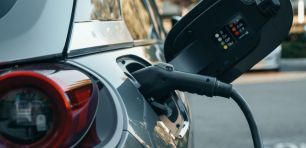
Source: Shutterstock.
Melbourne EV charging company, JET Charge has just launched a $24.9 million ‘Charging as a Service’ (CaaS) project to make it easier for business fleets to switch to EVs.
This follows a successful $25 million Series B raise back in 2022, which was led by the RACV with participation from the Clean Energy Finance Corporation (CEFC), Claremont Capital and others.
The idea behind the project is to offer businesses this new CaaS model, in which JET Charge both installs and maintains the EV chargers for a business. This can be both on-site and at the homes of employees, and it will include any repairs and ongoing reporting necessary.
This will come at no upfront cost to a business. Instead, it will work on a subscription model. However, specific pricing details around this are yet to be released. JET Charge has confirmed that it can provide lower charging costs to its customers with economy of scale.
To qualify for the subsidised service, you have to be an Australian business fleet operator and consent to JET Charge gathering charging activity data. However, that data will be anonymised when utilised for project reporting. Each subsidised charger must also be tied to a specific EV in the fleet.
“We know that fleets are looking for a way to electrify, and that infrastructure is a key barrier. Our CaaS project will not only increase affordability but also demonstrate what running private charging networks will look like at scale,” Tim Washington, CEO of JET Charge, said in a statement.
The Australian Renewable Energy Agency (ARENA) is supporting the initiative by providing $12 million from the government’s Driving the Nation Fund. According to ARENA, the CaaS model being offered by JET Charge will lead to an uptick in EV adoption.
“We know that access to charging infrastructure is a barrier for fleet users looking to switch to EVs, so it’s exciting to see JET Charge developing a new way to make charging more accessible,” Darren Miller, CEO of ARENA, said in a statement.
“Not only will this project put over 3,000 new electric vehicles on the road, but it will also help prove the charging as a service model and hopefully lead to services like this rolling out across Australia.”
According to the Minister for Climate Change and Energy, Chris Bowen (who was present at the launch of this initiative), fleets make up 50% of new vehicle sales in Australia.
“Greater uptake among fleets will help grow a second-hand market and help get more Australians behind the wheel of an EV,” minister Bowen’s office said.
“After a decade of policy inaction, including a ridiculous scare campaign about EVs ‘ending the weekend’, EVs have now jumped from 2% of new car sales in May 2022 to almost 9% today.”
Back in August, the Electric Vehicle Council released its 2023 State of Electric Vehicles report. Besides reminding us that Australia is decades behind some other countries when it comes to EV incentives, it also showed there is very little business-specific for switching to EVs. Perhaps initiatives such as JET Charge’s CaaS model will put a dent in changing that.



COMMENTS
SmartCompany is committed to hosting lively discussions. Help us keep the conversation useful, interesting and welcoming. We aim to publish comments quickly in the interest of promoting robust conversation, but we’re a small team and we deploy filters to protect against legal risk. Occasionally your comment may be held up while it is being reviewed, but we’re working as fast as we can to keep the conversation rolling.
The SmartCompany comment section is members-only content. Please subscribe to leave a comment.
The SmartCompany comment section is members-only content. Please login to leave a comment.